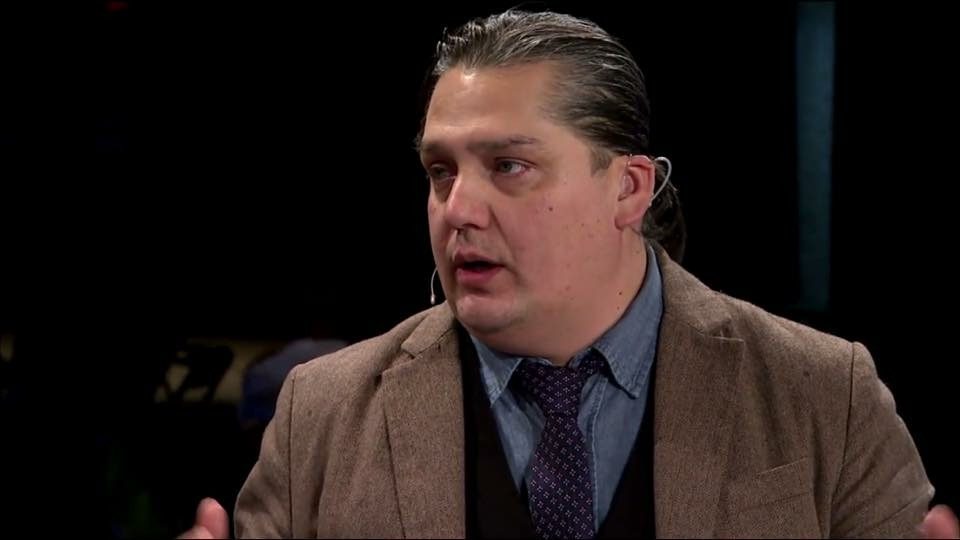
On November 20, 2017, Tim Fontaine, formerly of CBC, shared two articles on twitter from Walking Eagle. One headline read, “Rookie chiefs call for end to hazing at Assembly of First Nations,” while the other read, “Proposed pipeline will cross through every single Indigenous community in the country.” There were no bylines and the contact page suggested reaching out to APTN or CBC Indigenous with any news tips. Walking Eagle appeared innocuously enough, and for five days churned out stories anonymously. Then Fontaine revealed himself as the Editor-in-Grand-Chief on twitter.
Fontaine began writing for newspapers in 1999 and has since worked with APTN and CBC covering Indigenous issues. What began as a hobby is now quickly gaining notoriety as a satirical news site that successfully blends tongue-in-cheek Indigenous humour with the bizarreness of fake news articles.
RRJ: What was the inspiration behind Walking Eagle?
Fontaine: It’s stuff that I had in my head for a long time. I always found it kind of humorous when you combine news with absurdity. I think that’s why I find the Onion and the Beaverton so funny; they really do the job of combining the two. I kind of started it all with a writing exercise. The first thing I wrote was this fake news article and, I thought, “Wait a second, I could create a site here and actually do this because I have plenty of ideas like that.” So that’s how it came together; I didn’t actually set out to do this.
The humour that you’re using is very tongue in cheek, it’s very Indigenous. How it has been received by non-Indigenous folks?
At first some didn’t know if they could laugh. I had people inbox me and say, “Am I allowed to laugh at this?” Which I thought was hilarious because I thought [the jokes] were pretty obvious. Then I almost became unapologetic about it. To be able to have something that speaks to our sense of humour [as Indigenous people] first is a nice change. Now most people I show it to seem to really like it. I get a lot of messages from non-Indigenous people now saying that they love it.
Being from a reserve and being Anishinaabe myself, I always found interesting bringing someone down to meet family who isn’t Indigenous when it comes to the humour. The line between what was a joke and what wasn’t clear cut for non-Indigenous folks. Has that proven to be a challenge at all?
It’s weird, because I guess there is an Indigenous and a non-Indigenous sense of humour. I’ve certainly seen it. When we’re together we joke differently than when we’re with other people. Some of it is purely for us and some of it is for everybody. That goes back to my career in journalism. Because when you write articles you have to assume that when somebody reads it they‘ve never heard of any of this before. So you’re always trying to balance knowing what you’re talking about but at the same time making it accessible so that people learn something from it. That was the other thing about this site, people who may not have got[the jokes] initially, did a bit of research in order to get it. That was a surprise. It wasn’t my intention to educate people with the site, but it’s from there that people are making an effort to find out what are the issues facing Indigenous people, and that’s good.
Do you see Walking Eagle as more of a hobby right now?
It’s a hobby and it started as an exercise. I read Stephen King’s book On Writing, and it really struck me because he said “just write.” I want to write a book so I started writing whatever I could, and I would write stories that were in my head. More and more it started turning towards humour because I’ve always joked around so it was naturally going that way. It sort of became a hobby and I still see it as a hobby and I’m doing it whenever I have a spare minute. It’s not real journalism.
One last question: how did you come up with the name Walking Eagle?
The name is a very old and very corny dad joke that both Indigenous and non-Indigenous people tell about a name that is bestowed on some political figure or historic figure. It’s almost like a fake news story: There’s this president, and he gets an Indian name from a community. He’s all happy and he leaves. Then somebody goes and asks one of the elders what does that name, Walking Eagle, mean? And the elder says, “It’s a bird that’s so full of crap it can’t fly.” So when I was putting the site together I was struggling to come up with a name. I was going to call it The Slop Bucket news or the Honey Bucket News because that’s something else that’s full of crap—it’s a portable toilet. But I thought, nobody is going to know what that is. It’s not “Indigenous” enough. I remembered that joke of Walking Eagle. It serves as a warning to whoever might think that it’s a real story.